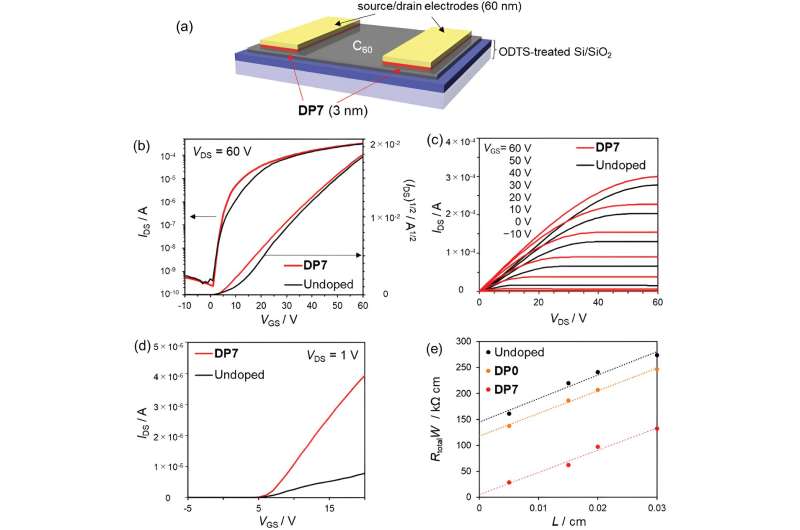
RIKEN chemists have developed a molecule that enhances the performance of organic electronic devices and is also more stable than previous alternatives, raising the chances that it could be used in industrial manufacturing processes. The study is published in Advanced Materials.
Conventional electronic devices are made from hard semiconductors such as silicon, but increasingly organic semiconductor molecules are appearing in devices such as televisions and cell-phone displays that use organic light-emitting diodes (OLEDs).
“Organic electronic devices are strong candidates for thin, light and flexible devices, which are not easily realized using inorganic materials,” explains Kazuo Takimiya of the RIKEN Center for Emergent Matter Science, who led the research.
But organic semiconductors need a helping hand from other molecules, known as dopants, to boost the flow of charge through them. For example, some dopants contain electrons in high-energy levels, which can be readily released into a semiconductor. But existing electron-donating organic dopants tend to be unstable, making them difficult to design, synthesize and handle, says Takimiya.
His team had previously studied derivatives of a molecule called tetraphenyl dipyranylidene, which could readily donate electrons to organic semiconductor materials. Now, by making further tweaks to this molecule, they have improved its stability at high temperatures.

The most promising alteration added nitrogen-based amine groups that push electrons into the molecule’s central region. Theoretical calculations suggested that the resulting molecule, dubbed DP7, has electrons at a sufficiently high energy level. Experiments showed that it is also very stable and can be added to devices by vacuum deposition—one of the most widely used processes in semiconductor manufacturing.
The team incorporated DP7 into several organic electronic devices, including an organic field-effect transistor (OFET) that consisted of a thin film of buckminsterfullerene, or “buckyballs,” on top of a silicon-based substrate. They added ultrathin patches of DP7 to connect the buckminsterfullerene layer to gold electrodes.
The researchers found that the interface between buckminsterfullerene and DP7 had a much lower electrical resistance than previous variants of the dopant—indeed, it had one of the lowest resistances of any electron-doped OFET reported to date. This will enhance the flow of electrons into the buckminsterfullerene.
Furthermore, the device was stable, showing no degradation after being stored under an inert atmosphere for two weeks.
DP7 is easily made from commercially available chemicals using just two chemical reactions, and Takimiya is optimistic that it could find uses in industry. “For commercial devices, it could be used to improve the conductivity of the electron-transport layer in OLEDs, which are fabricated by vacuum processes.”
The researchers are now searching for other stable dopants that have even greater electron-donating abilities.
More information:
Takaya Matsuo et al, A Novel N‐Type Molecular Dopant With a Closed‐Shell Electronic Structure Applicable to the Vacuum‐Deposition Process, Advanced Materials (2024). DOI: 10.1002/adma.202311047
Citation:
Chemists develop robust molecule that gives organic electronic devices a boost (2024, July 11)
retrieved 11 July 2024
from https://phys.org/news/2024-07-chemists-robust-molecule-electronic-devices.html
This document is subject to copyright. Apart from any fair dealing for the purpose of private study or research, no
part may be reproduced without the written permission. The content is provided for information purposes only.







